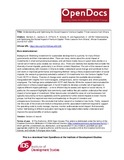| dc.contributor.author | Barnett, Christopher | |
| dc.contributor.author | Jackson, Edward | |
| dc.contributor.author | O'Flynn, Peter | |
| dc.contributor.author | Hamdiya, Ismaila | |
| dc.contributor.author | Coleman, Agyeyomah | |
| dc.date.accessioned | 2018-11-30T12:45:25Z | |
| dc.date.available | 2018-11-30T12:45:25Z | |
| dc.date.issued | 2018-11-13 | |
| dc.identifier.citation | Barnett, C.; Jackson, E.; O’Flynn, P.; Ismaila, H. and Agyeyomah, C. (2018) 'Understanding and Optimising the Social Impact of Venture Capital: Three Lessons from Ghana', African Evaluation Journal 6.2: a335 | en |
| dc.identifier.uri | https://opendocs.ids.ac.uk/opendocs/handle/20.500.12413/14152 | |
| dc.description.abstract | Background: Mobilising investment for sustainable development is a priority for many African governments and their international allies. There are many claims about the social impact of investments in small and growing businesses, and yet these mostly focus on good news stories or a narrow set of metrics (jobs created, tax revenue, etc.). There are relatively few studies that consider the diversity of social impacts, particularly in an African context.Objectives: The aim of this research was to work collaboratively with investors in Ghana to better understand social change and contribute to their own work on improved performance and reporting.Method: Using a theory-based examination of social impacts, the research purposively selected a subset of 13 investments from the Venture Capital Trust Fund (VCTF) in Ghana. Theories of change were used to explore the available documentation, triangulated with insights from fund managers, entrepreneurs, senior managers and, where possible, employees. The findings were validated with VCTF staff.Results: While the research demonstrated the usefulness of a theory-based approach, it found it helpful to develop a smaller set of typologies to capture different impact pathways – a more efficient way to assess and report on social returns. In particular, the research highlights how commonly used metrics like job creation undervalue the social impact of some types of investment. Other lessons also included the value of rural businesses (not typically favoured by venture capitalists) and the potential to further extend impacts to lower income groups, but that this required real intent and leadership on the part of investors and entrepreneurs.Conclusion: We conclude that further research is merited on two fronts. Firstly, research into the scale of the small and medium enterprises and the associated investment required to support the operating costs to really manage, improve, monitor and evaluate social impact. And secondly, further field testing of different evaluation techniques to help stakeholders better understand and improve the social benefits of venture capital. | en |
| dc.language.iso | en | en |
| dc.publisher | African Evaluation Journal | en |
| dc.relation.ispartofseries | African Evaluation Journal;6;2 | |
| dc.rights.uri | http://creativecommons.org/licenses/by/4.0/ | en |
| dc.subject | Economic Development | en |
| dc.subject | Finance | en |
| dc.title | Understanding and Optimising the Social Impact of Venture Capital: Three Lessons from Ghana | en |
| dc.type | Article | en |
| dc.rights.holder | The Authors | en |
| dc.identifier.externaluri | https://aejonline.org/index.php/aej/article/view/335/540 | en |
| dc.identifier.team | Business, Markets and the State | en |
| dc.identifier.doi | https://doi.org/10.4102/aej.v6i2.335 | |
| dcterms.dateAccepted | 2018-09-27 | |
| rioxxterms.funder | Default funder | en |
| rioxxterms.identifier.project | Default project | en |
| rioxxterms.version | VoR | en |
| rioxxterms.versionofrecord | https://doi.org/10.4102/aej.v6i2.335 | en |
| rioxxterms.funder.project | 9ce4e4dc-26e9-4d78-96e9-15e4dcac0642 | en |


